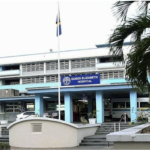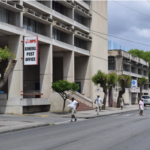Health Archives - Barbados Today
Hidden cure: Scientist urges investment in natural remedies
As the global health community sounds the alarm over the rate at which antimicrobial resistance (AMR) is rising and global health systems strain under the weight of complex diseases, Barbadian ethnobotanist Dr Sonia Peter is calling for a return to the island’s natural roots as a solution.
She is urging the government and private sector to invest seriously in the development of a local medicinal plant industry rooted in the island’s rich biodiversity and traditional healing knowledge.
“We need to go back into our history,” Dr Peter, director of the Biocultural Education and Research Programme, told Barbados TODAY over the weekend following a kitchening gardening workshop. “There is value in our plants, and there is value in our knowledge. What we lack is the investment and infrastructure to harness it properly.”
Citing a recent World Health Organisation (WHO) report on the integration of traditional medicine into public health systems, Dr Peter argued that Barbados must act now to both preserve and commercialise its botanical wealth before it disappears—along with critical knowledge passed down through generations.
“The WHO estimates that nearly 80 per cent of the global population still relies on traditional healing methods. That tells us this isn’t folklore—it’s fundamental, and we need to standardise it [local remedies] so people know how to use it safely and effectively,” she said.
Dr Peter’s warning comes amid rising global concern over antimicrobial resistance, a phenomenon where bacteria, viruses, and other pathogens evolve to outsmart conventional medications. The consequences are dire, she said, as common infections could become untreatable, surgeries riskier, and public health gains of the past century could be reversed.
“We’ve been treating microorganisms in a very temporary way. We treat them, then forget. We misuse medications. That’s how resistant strains emerge—organisms evolve, get stronger, and our drugs become useless,” she warned.
Her solution? A homegrown response rooted in the Caribbean’s natural pharmacopeia.
Dr Peter explained that the Caribbean is a biodiversity hotspot, home to hundreds of unique plant species that produce molecules not found anywhere else in the world. This, she argues, places Barbados in a prime position to develop locally derived natural therapies that could supplement national healthcare efforts—and reduce dependency on imported drugs.
“These plants are making molecules peculiar to our region. That’s exactly where we should be looking for new treatments,” she said. “We must stop calling everything ‘bush’ and start seeing these resources for what they are—life-saving and economically valuable.
“We do not have the luxury of just doing science because we like it. As a small nation, we must extract value from our scientific investment, and that starts with protecting our intellectual property,” she stressed.
Over the years, Prime Minister Mia Mottley has lamented that there were too many people dying as a result of antimicrobial resistance while addressing audiences locally, regionally and internationally.
Mottley, who is co-chair of the One Health Quadripartite Global Leaders Group, said she had a moral duty to speak up about the dangers of overreliance on antibiotics, referring to it as a “slow motion silent pandemic”.
Beyond health, Dr Peter sees untapped economic potential in the development of a natural medicine sector in Barbados, pointing to Cuba’s successful model, which fuses traditional medicine with scientific rigour.
“Cuba is an excellent example. They’ve built a robust healthcare system partly on their own medicinal knowledge because they were forced to innovate. We don’t need to wait until we’re backed into a corner,” she said.
She envisions a dual-sector approach—combining research and development with eco-wellness tourism, where visitors can engage in healing retreats, botanical experiences, and herbal product lines unique to the island.
“This could be a niche market in tourism, as well as a driver of economic diversification. The future is in value-added knowledge, and we’re sitting on a green goldmine,” she said.
However, she also acknowledged the cultural fragmentation that has led to the erosion of traditional practices in Barbadian households.
“The grandmothers who once held this knowledge are now working. Our social structures have changed. But those gaps can be filled through education and outreach,” she explained.
Her programme seeks to reintroduce this lost knowledge into schools and communities, bridging generational divides and reigniting respect for local plants. “We must reconnect with our landscape, our heritage, and our health . . . We are cutting down plants without knowing their value. What if that plant was the cure for cancer?” she asked. “We need more rigorous policies around our botanical resources—and the courage to invest in ourselves.”
sheriabrathwaite@barbadostoday.bb
The post Hidden cure: Scientist urges investment in natural remedies appeared first on Barbados Today.
3 months 2 weeks ago
Health, Local News
Health Archives - Barbados Today
Youth advocates urge ad ban in childhood obesity fight
Youth advocates on Monday marked World Health Day by calling for a ban on the marketing of unhealthy foods to children, urging policymakers to build on recent health initiatives aimed at tackling the nation’s childhood obesity crisis.
In a letter to Suleiman Bulbulia, chair of the National NCD Commission, the youth representatives from the Heart and Stroke Foundation and the Barbados Childhood Obesity Prevention Coalition praised government policies designed to encourage Barbadians to adopt healthier eating habits and resist the marketing of unhealthy foods in schools.
“We wanted to say ‘thank you’ to our policymakers for the strides already made—like the 20 per cent tax on sugary drinks, the school nutrition policy implemented in February 2023, and the recent removal of VAT and import duties on certain fruits and vegetables,” said Michron Robinson, youth health advocacy officer.
“But we also wanted to raise the alarm on the need to ban direct marketing of unhealthy foods to children. Our schools should be safe, health-promoting spaces—not playgrounds for junk food advertising.”
Robinson noted that the school nutrition policy marks a significant shift in national health priorities, but implementation remains incomplete. One in three Barbadian children is overweight or obese, and the ripple effects are already being felt in families, workplaces, and the national economy.
“We have a crisis on our hands. Childhood obesity is not just a health issue—it’s a societal issue,” Robinson said. “Healthy beginnings are essential for hopeful futures, and that starts with what we allow into our schools, from food options to advertising.”
Bulbulia praised the youth advocates for their leadership and vowed to ensure their concerns reach key government ministries.
“Our youth are speaking clearly, and we’re listening,” said Bulbulia. “If we want a hopeful future for Barbados, we need to take care of our health now—not when we’re 40 or 50, but from early childhood. The school nutrition policy is a critical part of this.”
He stressed the contradiction in banning alcohol and tobacco advertising to minors while allowing the promotion of high-sugar, high-fat foods that lead to serious health problems.
The NCD Commission has pledged to expand public education and policy support for healthy eating, with Bulbulia noting that the broader cultural shift must also involve families, communities, and the private sector.
“This World Health Day, we encourage every Barbadian to reflect not just on their personal habits but on the systems that influence those habits,” he said. “We have made progress, but we must now move with greater urgency to protect the next generation.”
(SZB)
The post Youth advocates urge ad ban in childhood obesity fight appeared first on Barbados Today.
3 months 2 weeks ago
Health, Local News
Health Archives - Barbados Today
Energy drink distributor slammed for ‘environmental neglect’
Environmentalist Kammie Holder has launched a scathing attack on the importer of a popular Jamaican energy drink, accusing the company of flouting environmental laws and neglecting its corporate social responsibility as discarded bottles increasingly litter the island.
Holder, the chair of the Future Centre Trust, accused beverage distributors of prioritising profits over environmental responsibility, amid complaints that bottle returns were not being accepted.
Speaking about the distributor of the drink in question, he disclosed: “We have reached out after getting concerns from the hikers in this country and the public at large to that importer, who has treated us with scant respect as it related to their corporate social responsibility.
“Within 48 hours, I shall be writing to the Ministry of Commerce, under which the Returnable Containers Act falls, and I shall be writing to that company to ask them where is their corporate social responsibility as it relates to that drink that they import from Jamaica,” Holder said on Wednesday.
The Returnable Containers Act of 1986 establishes a mandatory deposit-and-refund system for empty beverage containers. In 2019, it was amended to expand the list of containers that should be accepted for return to include separate sealed glass, metal, aluminium, steel or plastic bottle, can, jar, carton or other receptacles which may consist of other materials that are recyclable or reusable and is capable of holding 3.8 litres or less. This amendment gives reusable items other than polyethylene terephthalate (PET) bottles and glass bottles value, as they can be redeemed for between five cents to 15 cents each.
Some of the representatives from the 11 charities seen here with the donations they received.
Holder further lambasted the distributor’s boastful claims of financial success despite failing to address the pollution caused by their product. He stated: “It’s totally unacceptable that you can brag about your millions that you are making yearly [but] you have no concern for the environment. My voice may be strong, but I have zero tolerance for ignorance when it comes to our environment.
“If I was the minister, those drinks would be banned from Barbados. If you are going to be so bold to speak of the millions you are making but continue to import a drink from Jamaica, and then your bottles are littering this country—my beautiful country—and then the importers are not taking the bottles back, to then brag about the millions you are making yearly? Unacceptable.”
Holder also criticised the lax enforcement of littering laws, stating that despite the strengthening of environmental protection laws over the years, authorities have been slow to engage in strong enforcement measures.
He said: “Over the last 15 years, I’ve participated in Clean Up Barbados, and persons have been caught littering and you know what happens? They get a slap on the wrist, which to me is an epic insult to those persons who every year go and participate in Clean Up Barbados. We are talking about thousands of persons every year cleaning up behind dirty persons, but yet when a person is caught, they are told to go and get it cleaned up.
“Totally unacceptable, so until you have the police service, a ministry, an inspectorate taking it seriously, nothing will change in this country,” Holder declared.
Paul Bynoe, managing director of B’s Recycling, echoed Holder’s concerns and revealed that attempts to engage with the drink’s distributor had been unsuccessful.
Bynoe said: “I don’t understand his story with the agent. We try to get all the agents to make contact in order for them to receive them back or let us know what to do and it’s just not happening. I don’t know what to say to them or what to do in order for them to understand that they are breaking the law, and the lawmakers now got to step in and say ‘okay, this is right or this is wrong—as far as I see it.”
Efforts by Barbados TODAY to reach the distributor for comment also proved unsuccessful.
(SB/SZB)
The post Energy drink distributor slammed for ‘environmental neglect’ appeared first on Barbados Today.
3 months 3 weeks ago
Health, Local News
Health Archives - Barbados Today
QEH dismisses blood supply crisis claims, assures public of stable stocks
The Queen Elizabeth Hospital (QEH) has firmly rejected claims circulating on social media that it is facing a blood supply crisis, insisting that current stocks remain “within required minimum levels”.
The hospital issued a statement on Friday addressing reports that alleged that the QEH had only 77 units of blood available and had been forced to outsource blood testing to the private sector due to shortages.
“The hospital is not facing a crisis, nor are we on the verge of running out of blood supplies,” the QEH insisted, adding that while “blood availability fluctuates based on patient needs, our team is actively managing supplies to ensure continued patient care”.
The statement also addressed concerns about laboratory testing capabilities, explaining that a “temporary reduction in reagent stock for one specific serological test (HTLV-1)” had been “swiftly identified, and the necessary resources have already arrived”.
According to the QEH, there has been “no interruption to blood testing or collection services” and the temporary outsourcing of some laboratory operations was described as “a proactive measure related to remedial cleaning efforts” rather than a response to any crisis.
The hospital emphasised that “at no point has this led to an inability to conduct critical testing” and encouraged eligible Barbadians to “continue donating blood to support our healthcare system”.
In its statement, the QEH urged the public to seek accurate information and avoid unnecessary panic, reaffirming its commitment to providing high-quality care to patients. (BT/PR)
The post QEH dismisses blood supply crisis claims, assures public of stable stocks appeared first on Barbados Today.
4 months 6 days ago
Health, Local News
Health Archives - Barbados Today
GPO denies rodent infestation after union claims
Health officials have found “no evidence of rodent infestation” at the General Post Office, Postmaster General Joann Busby has insisted, contradicting claims that prompted a union leader to advise workers to stay home over safety concerns. Busby strongly refuted the allegations, revealing that preventative cleaning measures were already planned for the weekend.
The head of the Unity Workers Union, Caswell Franklyn, said he had received complaints of rodent infestation on Wednesday and Thursday.
Franklyn had advised workers to refrain from reporting to their stations due to health and safety concerns but Busby insisted in a statement late Friday that workers need not be concerned.
Busby explained that management became aware of staff concerns about the possible presence of vermin yesterday and moved promptly to address the matter. Michelle Walrond, deputy postmaster general for operations and personnel, met with the staff and toured the area. As a result of the concerns expressed by staff members, out of an abundance of caution they were restricted from the area.
Busby said janitors were asked to wipe down the work surfaces and a professional cleaning firm was contacted to provide the necessary cleaning service in the area of concern. This was undertaken and staff, who remained sceptical on Friday were so advised by the senior postal superintendent of mails, Gracie Stephens-Nelson, who was on-site during the cleaning process.
This was followed by a meeting held by Cecil Benjamin, deputy postmaster general for international postal affairs and business development, with the assembled staff members to address their concerns.
Given that the GPO in Cheapside is surrounded by a fresh-produce market and several canteens – bait stations were located throughout the building. Busby said.
She added that in light of the staff concerns additional traps were set, and disputed the claims.
Busby said in a statement: “The allegations of the dead rodents around the building as a result, are completely erroneous. It seems that Mr Franklin was incorrectly informed. Moreover, management had already made arrangements for the industrial cleaning to take place on the weekend of March 22 and 23, 2025, to ensure that employees return to a safe and sanitary working environment on March 24, 2025. information of which Mr. Franklin was also unaware given his public statements.”
The postmaster general insisted that the safety and wellbeing of all postal workers are very important to this management team, saying: “We focus on resolving problems, once they are brought to our attention.”
Busby disclosed that a team from the Ministry of Health led by Principal Environmental Officer Lena Prescod as well as vector control officers from the Vector Control Unit visited the General Post Office for an inspection, following which Elly Holford, vector control officer, said that there was “no evidence of rodent infestation”.
Busby added that “in the interest of the peace of mind of our staff”, a Ministry of Health official is expected to visit the General Post Office Monday morning before staff members return to their stations.
“We are most grateful to them and Vector Control for their prompt response and their invaluable assistance in resolving this matter,” the postmaster general said in her statement. (BT)
The post GPO denies rodent infestation after union claims appeared first on Barbados Today.
4 months 6 days ago
Environment, Health, Local News
Health Archives - Barbados Today
BPSA: Make healthy food affordable instead of taxing snacks
Trisha Tannis, president of the Barbados Private Sector Association, has challenged the government to rethink its strategy on healthy eating, arguing that the latest measure to curb non-communicable diseases – a ‘sodium tax’ on salty snacks – is insufficient without making nutritious alternatives more affordable for low-income families.
“As much as I support the thrust to reduce NCDs—and it is a must—the government has been congratulated for putting that in the crosshairs,” Tannis said. “But I would like to see an equal amount of strategy and emphasis on reducing the cost of healthy foods because when mothers, particularly in the vulnerable economic population, go into the supermarket, they are not making a nutritional choice. They are making an economic choice.”
Her comments come in response to the government’s latest budget proposal, which introduces new taxes on salted snacks such as potato chips and corn curls in an effort to discourage unhealthy eating habits. Tannis argued that this approach remains “ad hoc” and does not provide struggling families with viable alternatives.
“You simply give that woman an impossible decision to make,” she said, further noting the financial strain that many shoppers face when trying to prioritise nutrition over affordability.
Tannis stressed the need for a targeted strategy that ensures a significant price reduction on essential fruits, vegetables, and other nutritious foods, suggesting that, just as unhealthy products are being taxed, healthier options should be deliberately made cheaper to empower households to make better dietary choices.
“We need a strategy that says you can pay extra for the bad things, and you can pay less for the good things,” she said. “Essentially, we need to empower households and women who are shopping for their children to make it easy to pick up the healthy things.”
(SM)
The post BPSA: Make healthy food affordable instead of taxing snacks appeared first on Barbados Today.
4 months 2 weeks ago
Business, Health, Local News
Health Archives - Barbados Today
Geriatric hospital to open ‘this year’
The government is on the cusp of completing a purpose-built geriatric hospital, with Senior Minister Dr William Duguid confirming that the project remains firmly on track for completion this year. The facility, intended to revolutionise elderly care, is part of a broader effort to address the needs of the nation’s ageing population.
Providing an update during the closing session of the Estimates debate on Friday, Dr Duguid detailed the significant progress made across various sections of the facility, highlighting that the ambitious project remains on schedule.
“Barbados will have a purpose-built geriatric hospital for its people,” he said. “We are making significant construction progress on this facility, and we are on target to have it completed this year,” he said. “The west wing is moving at pace, with slicking and priming completed on all floors. The first coat of paint is already being applied to the ground and first floors, and the installation of mechanical, electrical, and plumbing systems is nearing completion.”
The new geriatric hospital offers a modern, well-equipped environment tailored to meet the needs of the nation’s ageing population. In March 2023, during a groundbreaking ceremony to officially start construction of the Waterford, St Michael facility, officials announced that the project would be completed in just under two years at a cost of $1.307 million for phase one of the project. No projections were given for the cost of phase two of the three-storey state-of-the-art facility.
During the first phase of construction – the main hospital building – 300 beds and ten lounges were built, along with two treatment rooms per floor, a rehabilitation unit outfitted with a gym and pool for therapeutic services, a daycare facility, staff offices, amenities, and ancillary services. Phase two focused on another 105 bedrooms and six lounges.
He further outlined the advancements in other critical areas of the hospital, noting that exterior lighting and fixtures are being installed, while the administration core is progressing rapidly. “Slicking and priming of walls in the administration section are underway, and preparation for similar work is happening in the south wing. Kitchen drains are being installed, and the final portion of the ground floor slab is being prepared for casting,” he explained. “Construction and plastering of internal block work are ongoing on all floors.”
The minister emphasised that significant strides had also been made on other integral components of the hospital, including the annex, chapel, central plant, and generator building. “In the annex, slicking and priming are ongoing on all floors, while the superstructure and internal block work construction have been completed, with plastering nearing completion. Over at the chapel, the installation of the standing seam roof sheeting is in progress, and the interior finishing is well advanced,” Dr Duguid added.
The mechanical infrastructure, which is crucial to the hospital’s operational efficiency, has also seen notable headway. “The chillers have been placed on the concrete plinths in the chiller yard, with connections being made for chilled water pipes,” he said. “Installation of equipment in the pump room and central plant is progressing at speed. Meanwhile, the generator building’s structure has been completed, and interior and exterior painting is underway.”
Dr Duguid also highlighted key developments in the hospital’s surrounding infrastructure, stating that work on the main road and sidewalks is substantially complete. “We have finished cutting the wall and installing the sidewalk, while work on the internal access road and drainage installation is ongoing. Ninety per cent of the walkway along Waterford Main Road has already been cast, and we are now reinforcing the remaining portion.”
With nearly all trenches for the chilled water pipes dug and connections completed, the minister reaffirmed the government’s commitment to seeing the project through to completion.
(SZB)
The post Geriatric hospital to open ‘this year’ appeared first on Barbados Today.
4 months 2 weeks ago
Health, Local News
Health Archives - Barbados Today
Empowering Our Service Professionals: Breaking Free from Learned Helplessness
“We need fresh ideas! We value your input!” The words echo in meeting rooms across Barbados, often met with a mix of hope and skepticism. Too often, passionate service professionals, our nurses, teachers, police officers, and frontline workers, offer innovative solutions only to be met with resistance: “That’s not how we do things here.” This repeated dismissal breeds learned helplessness, a quiet erosion of initiative that leaves our vital services stagnant and our dedicated professionals burned out. This isn’t just about workplace morale; it’s about the quality of care and service our nation receives.
Barbados thrives on the dedication of its service professionals. From the bustling tourism sector to our essential public services, these individuals are the backbone of our communities. Yet, the very systems they serve within can inadvertently stifle their creativity and problem-solving. While we’re known for our vibrant spirit and “Bajan ingenuity,” too many good ideas remain unspoken, lost to the fear of rocking the boat or being labeled a troublemaker. This silence isn’t golden; it’s costly.
The consequences of learned helplessness are far-reaching. For individuals, it manifests as chronic stress, exhaustion, and burnout. The constant state of alert takes a toll, impacting mental and physical health. For organizations, it means lost innovation, decreased productivity, and high turnover. And for Barbados as a whole, it translates to a decline in the quality of essential services we all rely on.
The good news is that learned helplessness can be overcome. The key lies in fostering a culture of empowerment and providing service professionals with the tools they need to reclaim their agency. This is where self-care coaching, reframed as a strategy for professional development and organizational health, can play a transformative role.
Self-care coaching isn’t about spa days and bubble baths. It’s about equipping individuals with practical skills to:
Challenge Limiting Beliefs: Coaching helps professionals identify and dismantle the negative self-talk that perpetuates learned helplessness. It teaches them to recognize their value and advocate for their ideas effectively. For example, a teacher might learn to confidently propose new teaching methods, even if they deviate from tradition.
Develop Resilience Strategies: Service professionals often face challenging situations and resistance to change. Coaching provides them with strategies to navigate these obstacles, manage stress, and bounce back from setbacks. A nurse, for instance, might learn techniques for managing the emotional toll of demanding shifts while also developing strategies for advocating for better patient care.
Foster Collaboration and Communication: Coaching can facilitate open communication and collaboration within teams. It helps professionals express their concerns constructively, build consensus, and work together to implement positive changes. Imagine a police officer using coaching skills to facilitate community dialogues and build stronger relationships with residents.
Drive Systemic Change: When service professionals feel empowered, they become agents of change within their organizations. They can champion new initiatives, advocate for policy improvements, and create a ripple effect that transforms workplace culture. This could involve a group of firefighters working together to improve safety protocols or a team of tourism workers developing innovative ways to enhance the visitor experience.
To leaders across Barbados: Investing in self-care coaching is not an expense; it’s an investment in the future of our essential services. It’s about creating workplaces where professionals feel valued, supported, and empowered to contribute their best. It’s about building a stronger, more resilient Barbados.
To every service professional: Your well-being matters. Your voice matters. Don’t let learned helplessness silence you. Seek out resources, connect with colleagues, and become an advocate for positive change within your workplace and your community.
Let’s break the cycle of learned helplessness and unleash the full potential of our service professionals. Together, we can build a Barbados where everyone thrives.
The post Empowering Our Service Professionals: Breaking Free from Learned Helplessness appeared first on Barbados Today.
5 months 1 day ago
Health, Local News
Health Archives - Barbados Today
Call for legislation to regulate school vendors amid health concerns
School principals have urged swift action to regulate vendors operating outside school premises, citing concerns over students’ health and the circumvention of nutrition policies.
Robin Douglas, president of the Barbados Association of Principals of Public Secondary Schools (BAPPSS), has called for immediate legislation to address the issue, on the heels of recent reports of suspected psychoactive substance sales to primary school children.
He expressed concern that at present, students can buy what they want from vendors before school in the morning and afterwards in the afternoon and nothing can be done about it.
Using the Schools’ Nutrition Policy and a recent revelation by the National Council on Substance Abuse (NCSA) of the suspected sale of psychoactive substances to primary school children as a reference point, Douglas stressed that while he could not accuse any vendor of criminal activity, there is urgent need for legislation to control what is happening outside the gates of schools.
“There is need for legislation to be rewritten to be able to have something to say to persons outside of the schools’ compound. My school here at Combermere would not be the only problem, this is a problem across all schools, where vendors that are on the outside of the compound, there is nothing that you can do to stop them from being where they are,” the BAPPSS leader told Barbados TODAY.
Acknowledging that the situation poses a challenge to school administrators, Douglas, principal of the Combermere School, suggested that the time may now be right for the call for legislation to be heeded to hasten the legal process.
“The sooner, the better. There is need to heed a strong call that indicates there are major concerns regarding, not just the dietary concerns, but more concerns for the mental and physical health of our children because of the concerns regarding the things that we can’t control,” he said.
“The reality is,” the educational administrator added, “if you have a nutrition policy that is being circumvented by the fact that children can either buy what they want to eat in the morning or just hold their money and buy it when they leave in the evening, then the nutrition policy is being circumvented, and the in-school canteen, they comply with the measures for the nutrition policy, would of course, see a reduced revenue from students who would then buy outside. So it is a difficult situation, and there are not many avenues for school administrators to take.”
Douglas gave an assurance that administrators would not want to deprive anyone of opportunities to make an honest living, but at the same time, he is adamant that school authorities still needed to be more vigilant and watch for any signs of changes in behaviour so they can determine the source.
The BAPPSS president insisted: “I would not be so bold as to suggest that anybody is doing anything criminal. Persons are trying to make a living. However, one of the main difficulties is the way in which it works against the implementation of our nutrition policy.”
He suggested the need for even greater vigilance over what children are consuming in light of the suspected sale of drugs to students.
“There is little that can be done regarding external vending. Without having evidence to suggest that someone is involved in that type of activity, you certainly can’t place that upon persons. It is about vigilance and response given the current concerns that you would have,” Douglas contended.
He said while there is no legal backing to move vendors from outside schools, the only other possible options may be if they are operating from people’s lands without permission or don’t possess health certificates. Vendors can also circumvent these certificates, he explained.
emmanueljoseph@barbadostoday.bb
The post Call for legislation to regulate school vendors amid health concerns appeared first on Barbados Today.
5 months 1 week ago
Health, Local News
Health Archives - Barbados Today
Prostate cancer rates alarm as younger Barbadians at risk
The Barbados Cancer Society (BCS) has sounded the alarm on the increasing incidence of colon cancer in the country, attributing it largely to Barbadians’ current diet.
The Barbados Cancer Society (BCS) has sounded the alarm on the increasing incidence of colon cancer in the country, attributing it largely to Barbadians’ current diet.
This urgent health concern was highlighted during the society’s annual raffle prize-giving ceremony, where campaigners called for immediate action to address the growing crisis.
The Cancer Society president, Professor David Rosin, emphasised the urgent need for dietary improvements to curb the trend.
“The [second] most common cancer [here] is colon cancer [and] it’s probably due to diet,” he explained. “It’s another cancer that is also more commonly passed down through families. Why it is increasing here [however] is because of the diet. Your parents and grandparents ate a much healthier diet with high fibre, lots of breadfruit, etcetera, whereas nowadays, I’m afraid to say, it’s a lot of fast food and food which is low in fibre.
“Really, we have to impress upon people and also the young people in the schools that they should eat healthy.”
The professor also highlighted the prevalence of prostate cancer, with over 300 cases reported annually.
Professor Rosin said: “Here in Barbados, the commonest of cancer is still – despite it being half the population [men] – prostate cancer.
There are in fact 320 new cases every year out of a population of 285 000 people. That is about 45 per cent of all cancers [reported locally]. It’s really something to worry about.
“The anxiety here is not only is it the commonest cancer, but it is also unfortunately more aggressive and occurring in younger men.”
Shelly-Ann Forde, the society’s administrative director, added that recent community outreach efforts have seen rising interest among some men in coming forward for the necessary testing.
She said: “At a recent outreach event sponsored by [the Bureau of] Gender Affairs, we were doing free screenings and we even had to turn back some of the men. We already had the initiative to go out into the community before that, but that kind of reinforced the fact that men do want to be screened, and if there is an opportunity they do come out and try to be screened.”
However, Professor Rosin said the current number of men coming forward remains inadequate and urged families to encourage testing.
He said: “I would ask their wives, sisters, brothers, to come forward and say to them ‘be sensible; go and have a PSA test’. If you can [diagnose] a cancer at the beginning, the treatment is much less aggressive, and you won’t need radical surgery, radiotherapy, chemotherapy, all that. It’s really almost stupid not to be screened.”
During the event, the first-place winners of the 2024 BCS raffle, Raymond and Sheena Gill, represented by Shauntel Rock, received a $25 000 prize. They donated $5 000 of their winnings to the Cancer Society.
The post Prostate cancer rates alarm as younger Barbadians at risk appeared first on Barbados Today.
6 months 3 days ago
Health, Local News









